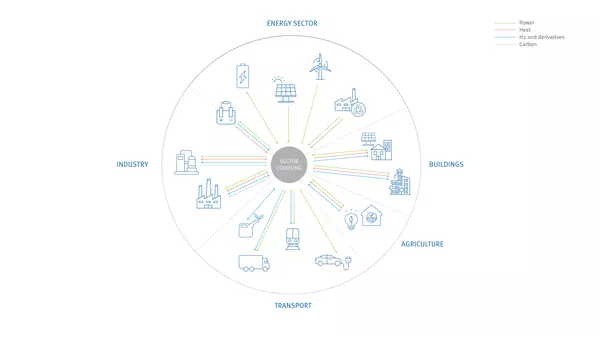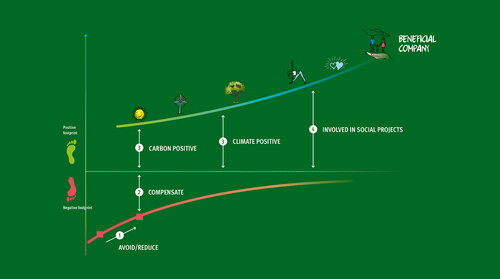ZERO CARBON – A CHALLENGE AND AN OPPORTUNITY FOR THE ECONOMY AND SOCIETY
Reducing emissions while staying competitive: Both society and the economy face the task of reducing carbon emissions in all areas, ideally to zero. Drees & Sommer supports organizations, companies, and local and city authorities with their transformation to zero carbon. The challenge here is to design the transformation in a way that ensures intergenerational equity – while at the same time focusing on Germany as an industrial location and securing our technological competitive advantage.
WHAT DOES ZERO CARBON MEAN?
Zero carbon means the necessary and comprehensive decarbonization of all sectors. Fossil fuels such as coal, oil and natural gas will have to be completely replaced by renewable energies (such as solar, wind power and geothermal) – and raw materials in industry, replaced, for example, by ‘green’ hydrogen. The use of waste heat as green process heat is also of central importance as an element of the green heating transition. In a broader context, carbon cycles must be established – for example, CO2 from (industrial) processes and in the atmosphere can be turned into usable resources through the use of technologies such as Carbon Capture and Utilization (CCU), Carbon Dioxide Removal (CDR) and Direct Air Capture (DAC).
WHY AND TO WHAT EXTENT IS ZERO CARBON RELEVANT FOR YOU?
Humanity cannot afford to allow climate change to continue unchecked if we want to preserve the fundamental basis of life. Societies and economic players must take responsibility.
- Future viability and corporate sustainability are at stake for all of us.
- The EU Green Deal – with the associated Environmental, Social, Governance (ESG) and regulatory framework (taxonomy) – mean that companies must start laying the groundwork for a sustainable future today if they want to remain competitive.
- This process starts with transparent sustainability analysis and the progressive reduction and replacement of fossil fuels and energy production systems with renewable technologies.
- It also requires the tracking and further development of solutions – leading to entire business processes becoming climate neutral.
THE FIRST STEP TOWARDS ZERO CARBON: OUR APPROACH: A HOLISTIC CARBON STRATEGY
We help you develop a holistic strategy for carbon neutrality. We work according to the ‘measure, reduce, offset’ principle:
- First, we carry out an analysis of the current situation and audit your carbon emissions. Based on the Greenhouse Gas Protocol, the focus is on direct emissions from combustion processes, indirect emissions from energy generation, and on all other indirect emissions from business activities.
- We then examine and define your carbon savings potential and show you economically feasible measures to reduce carbon.
- If required, we can support you with the implementation, monitoring and reporting of these measures.
ELEMENTARY: SECTOR COUPLING TO CREATE AN INTEGRATED OVERALL SYSTEM
The effective key to successful implementation of zero carbon is sector coupling: Industry, mobility, heat and electricity are then no longer considered in isolation, but interact with each other. Existing infrastructure is indispensable and must be integrated economically and intelligently.
Green heating transition
Green hydrogen
Renewables
Green industry
Restructuring of the power grids
Green mobility



